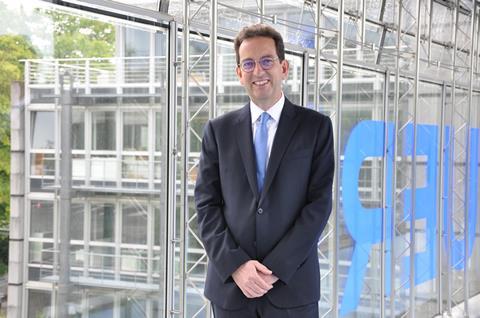The European Broadcasting Union’s Director of Technology & Innovation also discusses the organisation’s 5G Media Action Group and EuroVOX initiatives with David Davies.

It’s now a widely voiced opinion that, for all of its many challenges and tragedies, the global pandemic of 2020 has precipitated a remarkable surge in innovation.
Antonio Arcidiacono, the European Broadcasting Union’s director of technology and innovation, recognises that this dichotomy has led to increased awareness of new technologies and hence “some fantastic opportunities to implement innovation – and with those opportunities come new ways of developing stories and creating content.”
These impulses certainly resonate with Arcidiacono, who has been a prime mover behind several initiatives designed to “leverage the collective expertise and momentum of the EBU Membership for technology innovation” since he joined the organisation in September 2018.
Read more Whitepaper: 5G for the distribution of audio visual media
These projects encompass many different areas – from 5G production to content personalisation and native language translation – but have a shared purpose in “encouraging collaboration between our members in a way that helps them to optimise their use of the latest technologies to enhance their productions and services,” he observes.
Given the current excitement around 5G as an emerging method for broadcast production and distribution, it’s no surprise to discover that this technology is at the core of one of these initiatives. Backed by over 40 other organisations, the 5G Media Action Group (5G-MAG) is an industry association instigated by Arcidiacono and dedicated to ensuring that future 5G standards are “fit for purpose” in media production and distribution.
“The main aim of 5G-MAG is to give the media industry a voice in 5G,” he confirms, adding that efforts are focusing on two primary applications: distribution and remote production. In terms of distribution, “the overriding idea is that combining multicasting and edge-casting with unicast” is the only way in which 5G will be able to accommodate all areas and applications. With regard to remote production, 5G heralds “the opportunity for very agile contribution and production via the cloud. We are currently involved in an EU-sponsored project looking at how 5G [can be applied to these sorts of applications].”
Breaking down boundaries
In a similar spirit of intra-regional collaboration, Arcidiacono has also been closely involved with EuroVOX, a project that aims to “break down language boundaries for users and content. It’s a set of tools developed by us and our members to improve the ability to reach citizens in their own native languages. As well as giving them the opportunity to select the best sources for them, it also improves access to different content types.”
EuroVOX works by integrating vendors and language engines behind a single unified API, meaning that content creators only need to invest in an integration for their workflow once. Standard translation, speech-to-text and text-to-speech are among the services to have increased their reach as a result of the initiative, confirms Arcidiacono.
It has also been beneficial to broadcasters on a domestic competitive level. Evidently it is a strength, he notes, “to be able to offer a greater range of content [in native languages]. As a result service providers can improve their offer to the market.”
Listen The IBC Podcast: Interview with EBU director general Noel Curran
A similarly expansive philosophy underpins the continued development of Peach, the EBU Member-developed suite of personalisation tools. Leveraging AI and ML to locate archive content and identify trends that will engage newcomers, the Peach ‘personalisation and recommendation ecosystem’ is designed to support broadcasters as they deliver more distinctive products and engage with audiences on their digital platforms.
Swedish Radio is among the organisations to have adopted Peach most recently, and is using the suite as a running system to ingest data and receive value, which is made available to its journalists in the form of an assistive system that automatically surfaces relevant related stories on any given topic that a journalist is working on. With 30 staff members publishing an average of 350 news pieces per day, “Peach has proven to be a very good way of making better use of this content,” says Jörgen Bang, product owner for Personalisation at Swedish Radio.
Arcidiacono confirms the continued growth of the Peach ecosystem and its motivating idea that members can benefit from “combining resources in this way and then giving [the resulting tools] to the broader market”.
Beyond Covid-19
As to the impact of Covid-19 on EBU members, there is no doubt that the pandemic is serving “to accelerate the demand for remote and decentralised production. There was already a distinct trend towards IP distributed production, but [the crisis] has made it all ‘real’ for a much larger group of users and resulted in the gates really being opened up to innovation in this area.”
Away from the ‘pure’ technology issues, Coronavirus has also underlined the urgency of another EBU project – the Trusted News Initiative (TNI). Established in 2019 to protect audiences and users from disinformation during major events such as elections, TNI encourages news and tech organisations to work together to rapidly identify and stop the spread of dangerous content. In light of the pandemic, the timeliness of the initiative could hardly be more striking.
“Coronavirus has been extremely revealing in terms of the level of misinformation that has been spread around, both voluntarily and involuntarily,” says Arcidiacono. “For citizens the ability to access trusted news and information is fundamental; it’s critical that they are not blindsided by unreliable sources of information and people who are trying to distort reality.”
In this and any future period of heightened importance globally, TNI will allow partners to alert each other to disinformation so that content can be reviewed promptly by platforms, and removed where necessary. “The result will be that citizens will be put more ‘in the driving seat’ and not steered towards the kind of distorted news that can come from social networks,” concludes Arcidiacono.
For more information about EBU members and initiatives, please visit https://www.ebu.ch/home.



























No comments yet